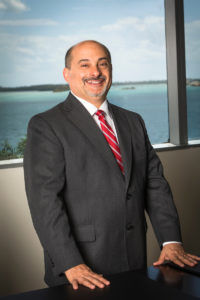Recoup From A Ponzi Past?
Law: After bankruptcy, lawsuit, Woodbridge tries a turnaround.
By Helen Floersh
Woodbridge Group of Cos. in December made headlines from Southern California to South Florida after it filed for Chapter 11 protection and was subsequently sued by the Securities and Exchange Commission for allegedly running a billion-dollar Ponzi scheme.
Woodbridge founder Robert H. Shapiro is alleged to have squandered investor money, paying big returns to old investors using fresh money from new investors, in classic Ponzi-scheme fashion. He enjoyed a lavish life, too, the SEC claimed, blowing millions on limousine service, fine wine and big parties attended by such prominent Republicans as Karl Rove.
Law: New Board Plans to Restructure Woodbridge
But what’s happened since is unusual. Ponzi schemes usually collapse upon being exposed. But management at the real estate investment firm – situated in a two-story office building on Ventura Boulevard in Sherman Oaks – appear set to overhaul its operations and try to make good with its creditors. The company announced early last month that it had cut all ties with Shapiro (not to be confused with renowned Los Angeles attorney Robert L. Shapiro, cofounder of LegalZoom.com Inc. in Glendale).
As part of a deal reached with federal regulators Jan. 24 in U.S. Bankruptcy Court in Wilmington, Del., the company has appointed a new board of directors to hunt for a chief executive who will spearhead a strategy to recoup the $1.2 billion Woodbridge raised from more than 8,400 investors. Meanwhile, the SEC has called off its request for a receiver.
“This board will guide Woodbridge through a fair and transparent restructuring process focused on maximizing recoveries for investors,” Woodbridge said in an e-mail to the Business Journal. “After conducting a comprehensive review of assets and operations, this board will begin developing a plan of reorganization, which will determine how creditor recoveries are managed and what Woodbridge might look like after the restructuring process is completed.”
Former management
Woodbridge investors in the past were told that the company was putting their money into high-interest loans made to luxury real estate developers. The borrowers were actually shell companies owned and operated by Shapiro, the SEC alleged in its Dec. 22 complaint.
“Shapiro promised investors they would be repaid from the high rates of interest (earned) on loans the companies were purportedly making to third-party borrowers,” the SEC wrote.
He allegedly used teams of internal and external sales agents to sell the securities to investors, at least 2,600 of whom were South Florida-based retirees who invested in Woodbridge using money from their Individual Retirement Accounts, the SEC alleged. They were guaranteed monthly interest and dividends from the so-called “hard money” loans Woodbridge was making.
Woodbridge claimed it generated between 11 and 15 percent annual interest for short-term financing, 5 to 10 percent of which was returned to investors, according to the SEC. In addition, investors were told they would see gains from the sale of real estate properties purchased and developed by the company, the SEC said. In reality, only about $14 million in interest was paid to Woodbridge by third-party borrowers, the SEC claimed. Roughly $103 million of new investors’ money was used to pay monthly interest and dividends to existing investors, with another $265 million paid as principal. At the time of the lawsuit, $961 million in principal remained due, the SEC said.
“The claimed interest payments from the purported third-party ‘property owners’ … did not exist,” the lawsuit stated. “Payments …derived almost exclusively from funds Woodbridge received from other investors.”
However, some purchases were, in fact, made. The real estate to which the Woodbridge loans referred included nearly 200 properties, most of them in Aspen, Colo. and Los Angeles, none of which investors had any say in choosing. The L.A. purchases were conducted through the company’s subsidiary Mercer Vine and included the historic Owlwood estate in Holmby Hills, which once belonged to Sonny Bono and Cher, as well as several other luxury properties, news reports said. Others were vacant lots “that have sat undeveloped for years,” the SEC claimed.
Meanwhile, Shapiro spent upwards of $21 million in investors’ money on himself and his family, the SEC said, including $34,000 on limousine services and $600,000 on political contributions. A local newspaper in Aspen detailed the events he threw with prominent Republican politicians, including former White House Advisor and Deputy Chief of Staff Rove along with current Energy Secretary Rick Perry. Other expenses included $1.4 million on luxury retail items and $1.2 million in alimony, SEC documents said. “Shapiro treated himself to an exorbitant lifestyle, at the investors’ expense,” the SEC said.
Restructuring
Shapiro resigned from Woodbridge Dec. 1, according to company documents. Through a transition services agreement between an LLC Shapiro established in September and Woodbridge, he named himself as a “consultant” to the firm at a monthly fee of $175,000. The agreement was terminated by the start of the year; Woodbridge said in a Jan. 2 press release that it had removed him from all matters involving the company.
Woodbridge had appointed Lawrence Perkins of L.A. management consultancy Sierra-Constellation Partners to steer the company through bankruptcy as its chief restructuring officer, but on Jan. 19 announced that he had resigned as Woodbridge seeks out a new chief executive with “homebuilding experience.”
As part of the agreement reached Jan. 23 in bankruptcy court, the company has appointed a trio of directors – Richard Nevins, M. Freddie Reiss and Michael Goldberg to oversee the search. Nevins is an attorney from Riverside, while Reiss most recently served as senior managing director in the corporate finance division of business advisory firm FTI consulting’s L.A. offices. Goldberg is the co-chair of the fraud and recovery practice group at the Fort Lauderdale, Fla. offices of Akerman, a Nevada-based law firm.
Reorganization: Investors Wait for SEC Inquiry
The company also has formed committees to represent investors’ interests, according to a release from the SEC. In turn, the SEC has withdrawn its request for a court-ordered trustee and a receivership for Woodbridge’s assets.
Investors will have to wait until bankruptcy proceedings are further along to know whether they will be able to recover much of their money. The company’s ability to emerge from the scandal unscathed will depend on both on their willingness to remain patient while the company restructures itself as well as what the SEC finds during its ongoing investigation, explained Arnie Lacayo, a Miami attorney at the firm Sequor Law and who is unconnected to Woodbridge but who reviewed the case at the Business Journal’s request. He noted the fact that the company declared bankruptcy voluntarily before being sued by the SEC may complicate the matter.
“(These kinds of cases) don’t normally involve bankruptcy where the business can be reorganized, though it does happen,” Lacayo said. “You have these very powerful forces that are clashing (the SEC and the federal bankrupt- cy court) as to what should happen next.” An attorney for Shapiro could not be reached, though his legal representative previously told the Wall Street Journal that Shapiro “denies any allegation of wrongdoing and looks forward to defending himself in a court of law.” The SEC declined to comment apart from its remarks in public materials.
For now, it remains to be seen whether Woodbridge will have to sell off its assets or be able to continue operations. Lacayo said the SEC could move to shut down the enterprise if it is proven that it was primarily run as a Ponzi scheme.
“(Woodbridge) will need to show that investments were made over time and that there was independence by the people charged with running the company.” he explained. “Investigators will get at those facts pretty quickly.”
To view full article, click here.






